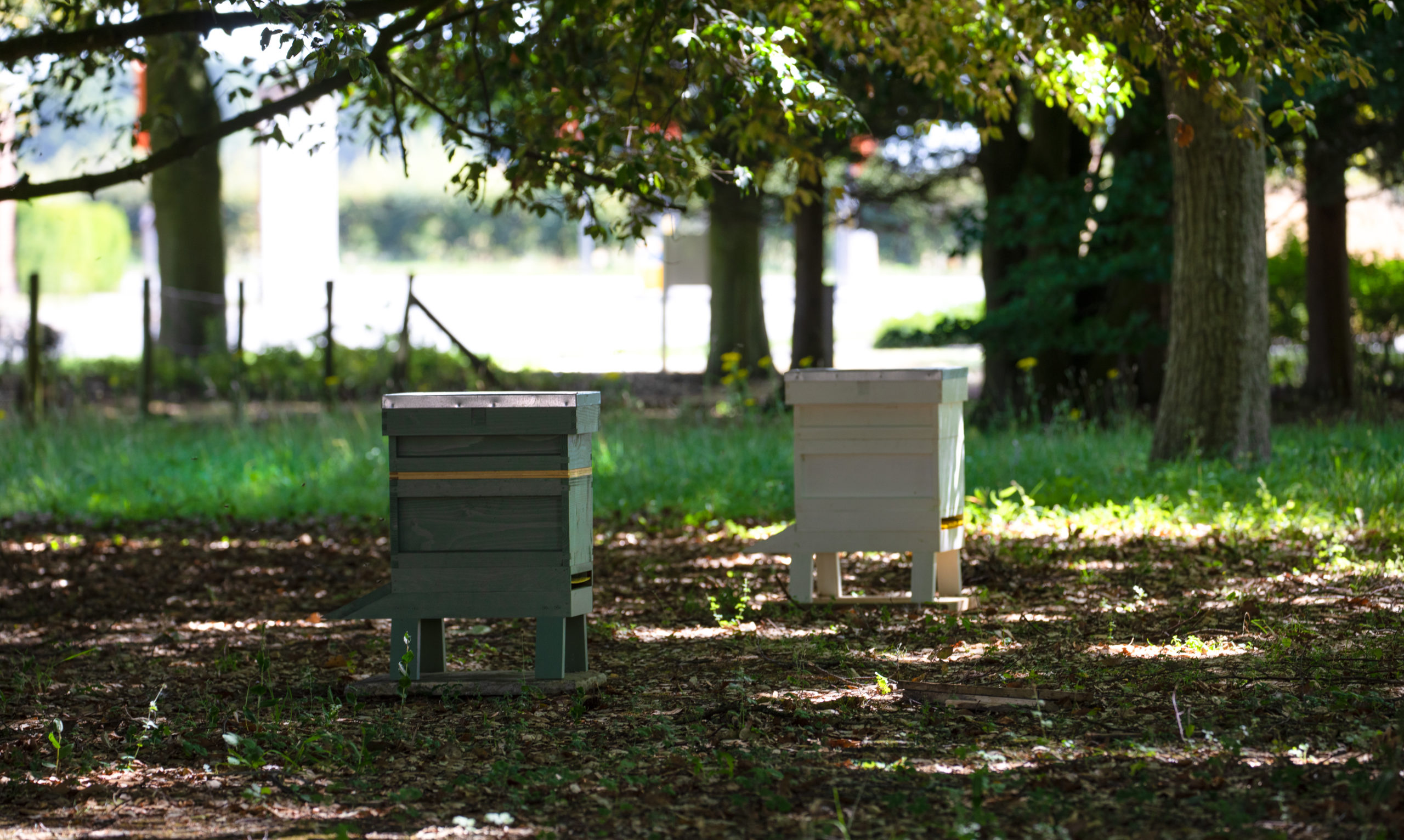Happy bees are vital for a healthy environment. We have six buzzing bee hives on campus, ruled by our three queens: Beeyonce, Rosalind Bee and Marie Curie Bee. Find out more in our Bee Diary below brought to you by James who works at JISC and is also our campus beekeeper.
August 2022
I visited the bees yesterday and I’m please to update that all is well, and they are happy!
Honey production has been slow this season, so I’m planning on not taking a hard-earned drop from them at all – Unless we get some epic rain, and the plants/flowers and bees manage to pull it out the bag as the season comes to a close. I won’t be taking any honey from my own bees either.
Tough season – The lack of rain has taken it toll on the flora and fauna for sure. They’ve spent a great deal of time gathering water and keeping their precious Kingdoms cool whilst trying to produce honey.
I have worked hard over the past months to bring colonies on, getting them up to good numbers and worked tirelessly to improve temperaments and attitudes. Re-Queening the colonies that were almost unmanageable has worked exceptionally well. As of yesterday, I didn’t even have to smoke them! Yes people, we have beautifully calm and super happy bees at last. This makes the weekly inspections so much easier AND we don’t lose as many bees to stinging; so, it’s complete win-win for us and, of course, the bees! Happy bees = happy beekeeper.
We did sadly lose a weaker colony over the winter which is completely normal and sometimes unexplainable. However, this colony has been replaced with a swarm without a home and is doing well. They do sometimes require a helping hand so I will be feeding when necessary – A simple sugar water recipe with added HiveAlive will do the trick. We’ve even been lucky enough to add an additional colony over the last month or so. The bees for the additional hive are currently in ‘’quarantine’’ until I give them the all-clear for disease and get them used to be being worked. Hopefully by next week I’ll be able to get them over to the campus apiary and settle them in. All-in-all a good-ish season, just a shame that the honey production is somewhat lacking this year. However, I’m sure honey is just a bonus to having these incredible creatures amongst us and not the main aim of the game
July 2022
July has been a scorcher here in Lincolnshire, with the hottest place in the UK recorded just a few miles away from us in Coningsby, at a whopping 40.3°C! This has obviously had an effect on the bees as they not only struggle to keep the hives at a constant, optimum temperature, but they have also had to deal with less forage. The wildflowers have come out at the apiary and the bees seem to have been foraging but the high temperatures must have caused them to dry up because there seems to have been a bit of a dearth in nectar. They are collecting a small amount but there is definitely not a flow on. Therefore, the bees have been fed just to keep them going through this spell of extreme heat.
June 2022
It has been a slow recovery from the mild winter months for our dear honeybees; they have had much loss to make up for. A mild winter in the life of a colony isn’t a good thing at all. The milder the weather, the more active they are. More activity = more honey consumption = possible starvation. We did lose a colony over the winter – Sadly, it’s just ‘’one of those things’’. The wet spring hasn’t been the greatest start to the year for the bees either!
Now, enough of the negative and gloom and onto to positive. The lost colony has been replaced and the other remaining colonies are building well. Temperament is good and activity high – Hurrah! Our now lovely, Queen Elizabeth II has been out on a Royal visit in the observation hive for World Bee Day 2022 at DiSH and will be out again this afternoon for the Harwell Biodiversity Walk – All very interesting and exciting!
So much design, planning and hard work has gone into the planting up of the campus and the flora on the campus is quite literally exploding with colour and the bees are now taking full advantage of the nectar flow, so do keep an eye out for them hurriedly going about their business as you stroll around the site.
January 2022
My first day back on the campus this year allowed me to take the opportunity to check the wellbeing of the bee colonies and I am overjoyed to report that they are all alive and seemingly well. I have added some fondant feeders to the bee hives just to help them along should they need it. I’ll give them intermittent and swift inspections until the season kicks in just to make sure they are alright. I’ll spend the remainder of the winter giving them fondant and then switch them to syrup in early spring to give them a head-start. Lets pray for a kind spring and even better summer.
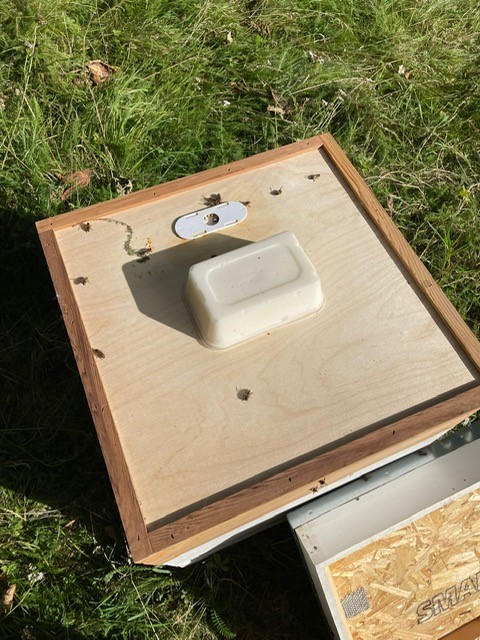
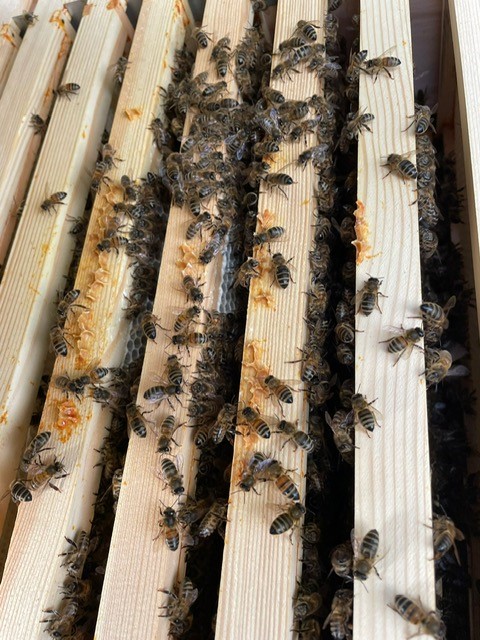
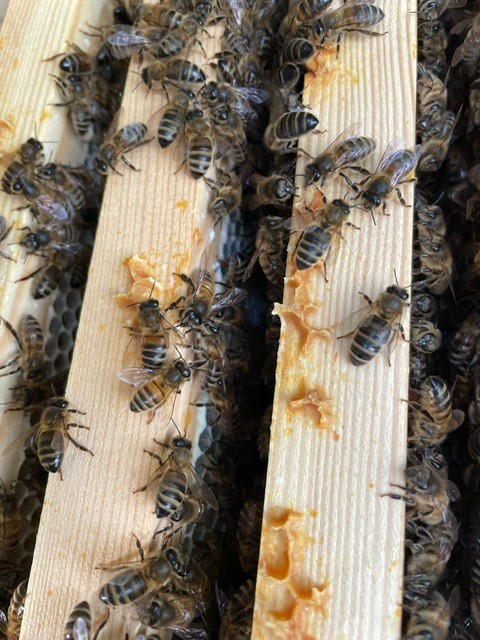
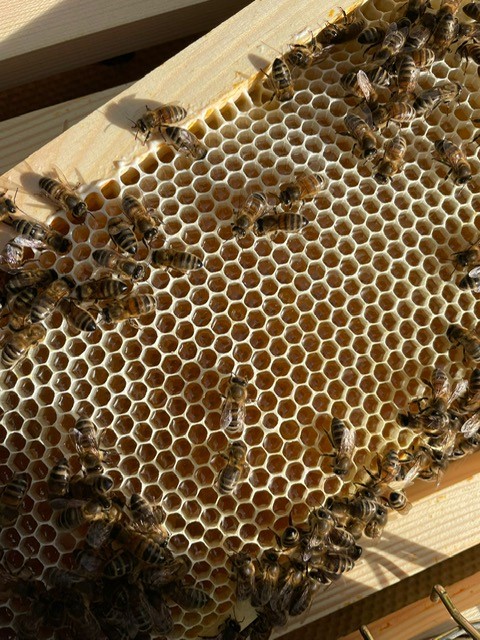
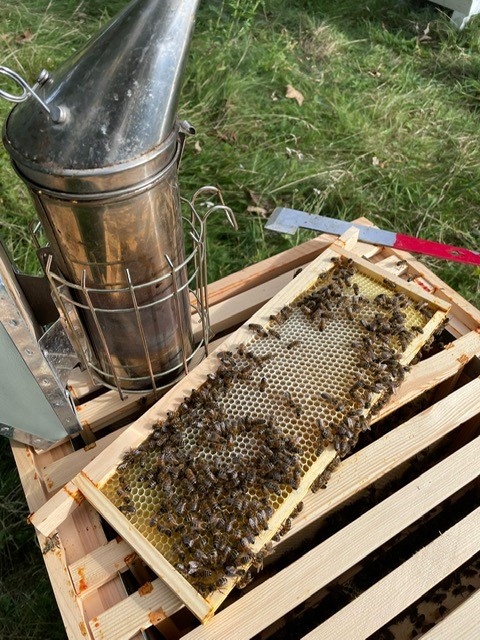
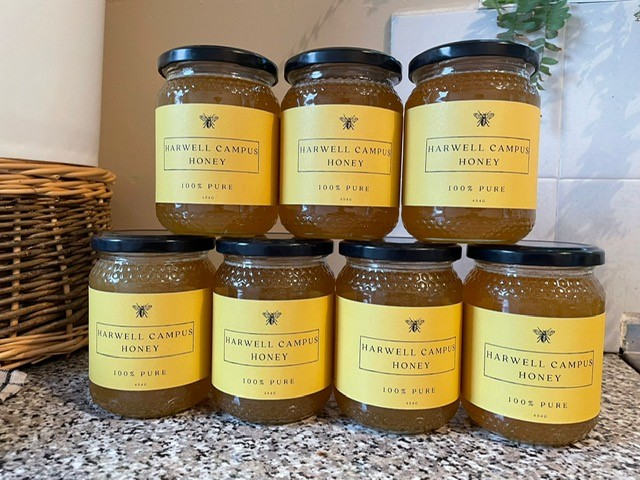
September 2021
Clearer board on Queen Beyoncé’s colony with a view to take supers off and spin honey over the weekend. The others have been given some food to aid them. They’re doing alright, but I want strong/prolific colonies going into spring next sprint so will be fondant feeding throughout the autumn and winter. Feeding fondant through the clearer boards over the winter won’t disturb the bees at all or cause them to lose valuable heat. It’ll be a quick swap of empty for full and they’ll take it if they need it. Sadly, that’s almost the season at a close now that the ivy is nearing its finish. The queens will slow down laying and some will cease completely until the spring .
We’ve had circa. 15 jars from the most productive hive, Queen Beyoncé’s colony (savage white hive), it’s been a difficult year. The other bee hives were new colonies so we wouldn’t pull anything from them in their first year. All focus has been on building those new colonies up and ensuring they are strong enough for winter – we’ve achieved that goal, thankfully.
July 2021
We ran a competition to name our three Queens, and I am pleased to announce they are now named Beeyonce, Rosalind Bee & Marie Curie Bee, after three incredibly inspirational women.
A National Beekeeping Inspector has been down to inspect the hives, and was delighted with the efforys surrounding the honeybee colonies and confirmed that the colonies are in tip-top health (albeit a little grumpy).
After Queen Elizabeth passed away, new Queen Beeyonce has successfully mated and is laying brillianlty. She is building the original colonies numbers back up once more. Honey is on it’s way, but has been slow this year but will extract what we can without leaving the bees short. So keep an eye out for Harwell Honey.
